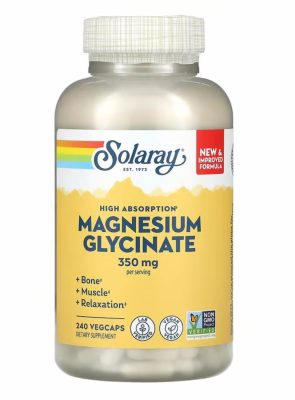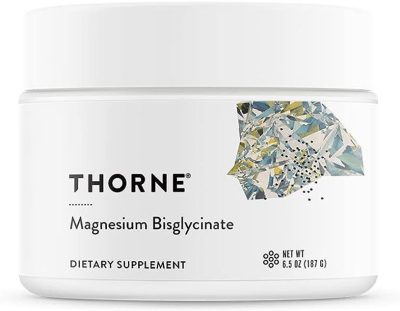Self-care encompasses nourishing the body and the mind to pursue holistic wellness, harmonious mood, better sleep, and radiant skin.
This article focuses on the benefits of magnesium glycinate (magnesium bis-glycinate), the difference between the other magnesium forms, and the best magnesium glycinate products available.
By understanding how these supplements contribute to inner balance, we empower ourselves to prioritize comprehensive self-care practices that nurture our bodies from the inside out.

Magnesium Glycinate Benefits
Magnesium is an essential mineral that is critical in numerous physiological processes. From supporting cardiovascular health to maintaining optimal nerve and muscle function, magnesium is involved in over 300 enzymatic reactions within the body. Despite its significance, many individuals fall short of meeting their daily magnesium requirements, highlighting the need for supplementation.
What is Magnesium Glycinate?
Magnesium glycinate is a chelated form of magnesium, wherein magnesium ions are bound to glycine, an amino acid. This unique molecular structure enhances its bioavailability and absorption within the body, leading to more significant health benefits than other magnesium supplements.
Definition and Composition
Magnesium glycinate, or magnesium bisglycinate, consists of magnesium ions bound to glycine molecules in a 1:2 ratio. This unique chelation process enhances the stability and solubility of magnesium, ensuring efficient absorption in the gastrointestinal tract. The presence of glycine further enhances the bioavailability of magnesium, leading to more significant health benefits than other magnesium supplements, making it an ideal choice for supplementation.
Magnesium Glycinate Absorption and Bioavailability
Unlike other forms of magnesium, such as magnesium oxide or magnesium sulfate, magnesium glycinate boasts superior absorption and bioavailability. Its chelated structure allows for gentle and efficient absorption in the intestines, minimizing the risk of gastrointestinal discomfort often associated with other forms of magnesium supplements. This high bioavailability ensures that more magnesium is absorbed and utilized by the body, maximizing its health-promoting effects.
In essence, magnesium glycinate offers a potent and well-tolerated means of replenishing magnesium levels in the body, thereby supporting overall health and wellness. Its superior absorption and bioavailability make it an indispensable tool for optimizing health and vitality in today’s fast-paced world.
Magnesium Glycinate Benefits
Magnesium Glycinate, a form of magnesium bound with glycine, offers many benefits for overall health and well-being. Let’s delve into its remarkable advantages:
Improving Sleep Quality
One of the standout benefits of magnesium glycinate is its ability to promote better sleep quality. Research suggests that magnesium plays a crucial role in regulating neurotransmitters involved in sleep, such as GABA. By enhancing relaxation and calming the nervous system, magnesium glycinate can help individuals achieve deeper, more restful sleep.

Reducing Stress and Anxiety
In today’s fast-paced world, stress and anxiety have become prevalent concerns for many individuals. Magnesium glycinate demonstrates promising effects in reducing stress and anxiety levels. It acts as a natural relaxant, soothing frazzled nerves and promoting a sense of calmness and relaxation.
Enhancing Cognitive Function
Magnesium is involved in numerous biochemical processes in the brain that are essential for cognitive function. Magnesium glycinate supplementation has been linked to improved memory, focus, and overall cognitive performance. By supporting neurotransmitter function and protecting brain cells from oxidative stress, magnesium glycinate may help sharpen mental clarity and cognitive abilities.

Supporting Muscle Relaxation
Muscle relaxation is another key benefit of magnesium glycinate. Magnesium is vital in muscle function and relaxation by regulating calcium levels within muscle cells. Supplementing with magnesium glycinate can help alleviate muscle tension and stiffness, making it an excellent choice for athletes, individuals with muscle cramps, or those experiencing muscular discomfort.
Regulating Blood Sugar Levels
Maintaining stable blood sugar levels is crucial for overall health, particularly for individuals at risk of or managing diabetes. Magnesium glycinate may aid blood sugar regulation by enhancing insulin sensitivity and promoting glucose uptake into cells. This can help prevent spikes and crashes in blood sugar levels, supporting energy levels and overall metabolic health.
Understanding Magnesium Glycinate vs. Citrate
While magnesium glycinate and magnesium citrate are popular forms of magnesium supplements, they differ in several aspects that may influence their suitability for individual needs.
Absorption Rate
Magnesium glycinate is often favored for its high bioavailability and gentle absorption rate. It is less likely to cause gastrointestinal distress than magnesium citrate, making it a preferred option for individuals with sensitive stomachs or who are prone to digestive issues.
Side Effects Comparison
Magnesium glycinate is generally well-tolerated, with minimal side effects reported. In contrast, magnesium citrate may have a laxative effect, leading to diarrhea or gastrointestinal discomfort in some individuals. Therefore, those seeking a magnesium supplement without digestive disturbances may opt for glycinate over citrate.
Suitable Uses for Each Form
Magnesium glycinate is often recommended for individuals seeking relaxation, improved sleep quality, and muscle relaxation without the risk of digestive upset. On the other hand, magnesium citrate may be preferred for its laxative effects, making it suitable for individuals experiencing occasional constipation or seeking to support regularity.
In conclusion, magnesium glycinate and magnesium citrate offer unique benefits and considerations. Understanding their differences can help individuals decide when selecting the most appropriate magnesium supplementation for their specific needs and preferences.
Best Practices: How Much Magnesium Glycinate Should I Take?
When optimizing your magnesium intake with magnesium glycinate, it’s essential to consider various factors to determine the right dosage for your needs.
Recommended Daily Allowance
The recommended daily allowance (RDA) for magnesium varies depending on age, gender, and specific health conditions. As a general guideline, adults typically require between 300 to 400 milligrams of magnesium daily. However, individual needs may vary based on diet, lifestyle, and underlying health conditions. Consulting with a healthcare professional can help determine the appropriate magnesium glycinate dosage tailored to your requirements.
Adjustments for Specific Needs
Certain individuals may require higher doses of magnesium glycinate to address specific health concerns or deficiencies. Stress, intense physical activity, or chronic health conditions may increase magnesium requirements. In such cases, healthcare professionals may recommend adjusting the dosage of magnesium glycinate accordingly to meet the body’s increased demand for this vital mineral.
Dosage for Improved Sleep
Magnesium glycinate can be particularly beneficial for individuals seeking to improve sleep quality and promote relaxation. Studies suggest that doses ranging from 200 to 400 milligrams of magnesium glycinate taken before bedtime may help enhance sleep duration and quality. However, individual responses may vary, so starting with a lower dose and gradually increasing as needed while monitoring for any potential side effects is advisable.
Exploring Magnesium Glycinate Side Effects
While magnesium glycinate is generally well-tolerated by most individuals, it’s essential to be aware of potential side effects and take precautions accordingly.
Overview of Potential Adverse Reactions
Common side effects of magnesium glycinate supplementation may include gastrointestinal discomfort, such as diarrhea, nausea, or abdominal cramping. These side effects are typically mild and transient, resolving independently with continued use or dose adjustment. However, individuals with pre-existing gastrointestinal conditions or sensitivities should exercise caution and consult with a healthcare professional before starting magnesium glycinate supplementation.
Risk Factors and Precautions
Certain populations may be at a higher risk of experiencing adverse reactions to magnesium glycinate, including individuals with kidney disorders or impaired kidney function. Since magnesium is excreted primarily through the kidneys, those with kidney issues should consult a healthcare provider before supplementing with magnesium glycinate to avoid potential complications. Additionally, individuals taking certain medications, such as diuretics or antibiotics, may require closer monitoring and dosage adjustments to prevent interactions or adverse effects.
Addressing Common Concerns
If you experience any discomfort or adverse reactions while taking magnesium glycinate, promptly communicating with your healthcare provider is essential. They can offer guidance on adjusting the dosage, addressing potential underlying issues, or exploring alternative forms of magnesium supplementation that may better suit your needs. By addressing concerns proactively and seeking professional guidance, you can mitigate the risk of side effects and maximize the benefits of magnesium glycinate supplementation.
When to Take Magnesium Glycinate: Timing Matters
The timing of magnesium glycinate supplementation can significantly impact its effectiveness and absorption within the body. Understanding the optimal times for taking magnesium glycinate can help maximize its benefits and support your overall wellness goals.
Best Time to Take Magnesium Glycinate
Magnesium glycinate is best absorbed with food, as other nutrients can enhance its uptake and utilization by the body. Dividing the daily dosage into smaller, evenly spaced doses throughout the day can also promote better absorption and minimize the risk of gastrointestinal discomfort.
Aligning Dosage with Goals
Depending on your health goals and objectives, you may adjust the timing of magnesium glycinate supplementation accordingly. Taking magnesium glycinate before bedtime may be most beneficial for individuals seeking to improve sleep quality or promote relaxation. Conversely, those aiming to support energy levels or muscle function may prefer to take magnesium glycinate earlier in the day to capitalize on its energizing effects.
Personalizing Your Supplement Schedule
Ultimately, the best time to take magnesium glycinate depends on your preferences, lifestyle, and health needs. Experimenting with different dosing schedules and observing how your body responds can help you determine the most effective and convenient supplement regimen. Whether you prefer to take magnesium glycinate with meals, before bedtime, or at other times throughout the day, consistency and adherence to your supplement schedule are key to maximizing its benefits and supporting your overall well-being.
Magnesium Bisglycinate Chelate, Magnesium Bisglycinate vs Glycinate
Let’s delve deeper into the similarities and potential differences between magnesium bisglycinate, magnesium glycinate, and magnesium glycinate chelate.
Magnesium glycinate (and magnesium bisglycinate) are a form of magnesium supplement where magnesium ions are bound or chelated to glycine, an amino acid. Each magnesium ion is chelated, or bound, to one glycine molecule in this compound.
Magnesium bisglycinate chelate means that the ions are chelated. While both terms (binding and chelating) are often used interchangeably in magnesium supplements, chelation specifically refers to forming a complex structure with multiple donor atoms. In contrast, binding describes the general interaction between two molecules.
Similarities
- Composition: All three terms refer to the same compound where magnesium ions are chelated to glycine molecules. In terms of chemical structure and elemental composition, they are identical.
- Bioavailability: Due to the chelation with glycine, all forms offer high bioavailability, meaning that the body absorbs and utilizes a significant portion of the magnesium.
- Gentleness: They are all well-tolerated and typically do not cause gastrointestinal discomfort, making them suitable for individuals with sensitive stomachs.
Potential Differences
- Manufacturing Processes: While the basic composition remains the same, slight variations in manufacturing processes or quality standards may exist between different products or brands. These differences could potentially affect factors such as purity, potency, or the presence of impurities.
- Additional Ingredients: Some magnesium supplements may include additional ingredients or excipients to improve stability, shelf life, or absorption. While the core ingredient remains magnesium bisglycinate/glycinate, the presence of these additional ingredients could influence the overall formulation and potentially result in differences in efficacy or tolerability.
- Labeling Variations: The use of different terms (bisglycinate, glycinate, chelate) may be influenced by marketing preferences or regulatory requirements in different regions. However, from a chemical standpoint, they all refer to the same compound.
Overall, while the core benefits of magnesium bisglycinate, magnesium glycinate, and magnesium glycinate chelate are largely similar, potential variations in manufacturing processes, additional ingredients, or labeling practices may result in subtle differences between products. Choosing a high-quality supplement from a reputable manufacturer is essential to ensure optimal efficacy and safety. If you have specific concerns or preferences, consulting with a healthcare professional or pharmacist can provide personalized guidance tailored to your needs.
Best Magnesium Glycinate
What is the best magnesium glycinate? Here are some product recommendations that have the best reviews, ingredient list, and optimal price for quality.
Solaray, Higher Absorption Magnesium Glycinate, 350 mg
±29,00€/29,99$ for 240 VegCaps
±16,51€/16,99$ for 240 VegCaps

This product is available on iHerb – https://www.iherb.com/pr/solaray-higher-absorption-magnesium-glycinate-350-mg-240-vegcaps/112970
For a discount, use Rewards Code: NAT0553
Product details
- Dietary Supplement – Magnesium (from Magnesium Bisglycinate), BioPerine® Black Pepper Extract (Piper nigrum)(fruit)
- Lab Verified
- Vegan
Magnesium Glycinate (also known as Bisglycinate) is believed to offer superior magnesium availability to the body. It is intended to provide nutritive support for normal, healthy muscle function.
Suggested use
Use only as directed. Take 4 VegCaps daily with a meal or glass of water.
Other ingredients
Vegetable cellulose capsule, magnesium stearate, cellulose, and silica.
Doctor’s Best, High Absorption Magnesium, 100 mg
±14€/10$ for 120 tablets
±25€/18$ for 240 tablets

This product is available on iHerb – https://pt.iherb.com/pr/doctor-s-best-high-absorption-magnesium-100-mg-240-tablets/16567
For a discount, use Rewards Code: NAT0553
Product details
- Dietary Supplement – lysinate glycinate chelate
- Vegan
- Non-GMO / Gluten Free / Soy Free
Doctor’s Best Magnesium provides a daily dose of high-absorption magnesium without gastrointestinal distress. This superior formula with 100% chelated lysinate glycinate magnesium absorbs effectively to support muscle relaxation and optimum nerve function.
- Supports muscle relaxation and restful sleep.
- Essential in 300 enzyme systems that support biochemical functions.
- Up to 6x better absorbed than other forms of magnesium.
Suggested use
Adult Use: Take two tablets twice daily or as a nutritionally informed physician recommends.
Other ingredients
Microcrystalline cellulose, croscarmellose sodium, magnesium stearate (vegetable source), stearic acid, hypromellose, and hydroxypropyl cellulose (coating).
Thorne Magnesium Bisglycinate
48$ for 6.5 oz (187 g)

Thorne Magnesium Bisglycinate is available here – https://www.iherb.com/pr/thorne-magnesium-bisglycinate-6-5-oz-187-g/72886
For a discount, use Rewards Code: NAT0553
Suggested use
Mix one scoop with at least 8 ounces of water daily or as your healthcare practitioner recommends.
Other ingredients
Citric acid, monk fruit concentrate. †
†This product uses Tate and Lyle’s Purefruit Select™ (Monk Fruit concentrate).
Warnings
If pregnant, consult your healthcare practitioner before using any supplements.
Frequently Asked Questions
What Does Magnesium Glycinate Do?
Magnesium glycinate exerts its therapeutic effects through various mechanisms of action. As a vital cofactor in enzymatic reactions, magnesium participates in energy metabolism, DNA synthesis, and protein synthesis. Additionally, magnesium modulates neurotransmitter activity, including NMDA receptors and GABA receptors, which play essential roles in mood regulation and stress response.
Magnesium glycinate’s impact extends to virtually every system in the body, reflecting its fundamental role in cellular function and homeostasis. From supporting cardiovascular health by regulating blood pressure and heart rhythm to enhancing muscle function and promoting relaxation, magnesium glycinate influences a myriad of physiological processes critical for overall well-being.
In real-life scenarios, magnesium glycinate has demonstrated remarkable efficacy in addressing various health concerns and improving quality of life. Whether it’s alleviating symptoms of anxiety and insomnia, enhancing cognitive function and mood stability, or supporting musculoskeletal health and metabolic function, magnesium glycinate offers tangible benefits that translate into tangible improvements in daily life.
What Is Magnesium Glycinate Good For?
Magnesium glycinate serves as a cornerstone of holistic wellness, nourishing the body from within and promoting balance across multiple dimensions of health. By addressing underlying deficiencies and supporting vital physiological processes, magnesium glycinate lays the foundation for comprehensive well-being, encompassing physical, mental, and emotional health.
Beyond general wellness support, magnesium glycinate can target specific health concerns and optimize targeted health outcomes. Whether it’s managing stress and anxiety, improving sleep quality, enhancing cognitive function, or supporting cardiovascular health, magnesium glycinate offers a versatile and tailored approach to addressing individual health needs.
Is magnesium glycinate the same as magnesium bisglycinate?
Yes, “magnesium glycinate” and “magnesium bisglycinate” are the same thing. They both refer to a form of magnesium where the magnesium ions are bound to glycine, an amino acid. This compound is often used as a dietary supplement due to its high absorption rate and lower likelihood of causing gastrointestinal discomfort than other magnesium forms. Both terms, “magnesium glycinate” and “magnesium bisglycinate,” are commonly used interchangeably in scientific literature and in the supplement industry.
What is the Difference Between Magnesium Glycinate vs. Citrate?
Here’s a comparison between magnesium bisglycinate and magnesium citrate:
Absorption Rate
Magnesium Bisglycinate: Highly absorbed with minimal risk of digestive discomfort.
Magnesium Citrate: Also well-absorbed but may cause diarrhea or loose stools due to its laxative effect.
Side Effects
Magnesium Bisglycinate Side Effects: Generally well-tolerated with few side effects.
Magnesium Citrate: Known for its laxative properties, which may lead to abdominal cramping or diarrhea.
Health Benefits
Magnesium Glycinate Benefits: Ideal for daily supplementation, particularly for sleep quality, stress reduction, and muscle relaxation.
Magnesium Citrate: Primarily used as a short-term laxative for constipation relief.
Suitability
Magnesium Bisglycinate: Suitable for those with sensitive stomachs or seeking long-term magnesium support.
Magnesium Citrate: Recommended for occasional use to alleviate constipation, but not ideal for daily supplementation.
In summary, magnesium bisglycinate offers gentle, well-absorbed magnesium supplementation without the risk of digestive issues, making it suitable for long-term use. Magnesium citrate is better suited for short-term relief of constipation and may not be suitable for daily use due to its potential side effects.
Keep Exploring:
Anua Skincare: Top 10 Products of 2025 – Reviewed